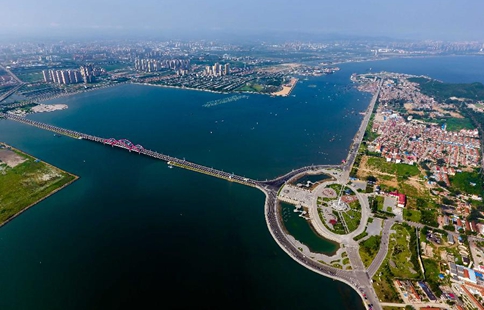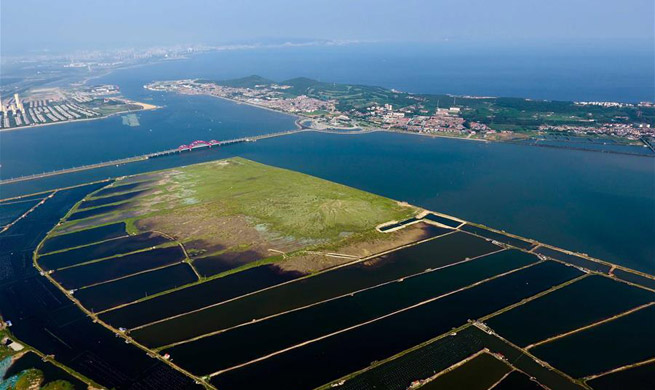ANKARA, Aug. 22 (Xinhua) -- The fact that Syrian Kurds are gaining power with more support from the U.S. has become the main reason for Turkey and Iran to seek military cooperation in the region, according to a local expert.
Increasing profile of Syrian Kurds antagonized not only the Turkish government but also alarmed Iranian administration as U.S. is increasing its leverage on the People's Protection Units (YPG), the militia of the Democratic Union Party (PYD) in Syria.
"Iran is seriously worried on rapprochement between Syrian Kurds and the U.S. and takes a step to preclude," Nihat Ali Ozcan, a security and outlawed Kurdistan Workers' Party (PKK) expert at the TOBB University of Economics and Technology, told Xinhua.
Therefore, Tehran proposes joint military operation to Turkey, he said, noting that two countries have carried out similar actions in 1990's against the PKK, but both parties were not satisfied on the success of those operations. "Iran had not held its promises at the time," the expert said.
A Turkish-Iranian joint military action against the PKK elements in the region would be a "positive step" in relations between the two counters, but would not be a "game changer" move to eradicate the militant group, Ozcan stated.
"A joint Turkish-Iranian operation against terrorist organizations in the region is always on the agenda," Turkish President Recep Tayyip Erdogan said on Monday commenting on media reports that Tehran proposed Ankara joint military action against the PKK elements in Iraq.
The details were discussed at the meeting of Chief of Staff of the Iranian Armed Forces Mohammad Baqeri and Chief of Turkish General Staff of Hulusi Akar in Ankara last week, he noted.
Iran, from time to time, made attempts for such visit to Turkey, but Turkish diplomacy was not leaning on the idea, yet the Turkish leadership has recently paved the way for the visit of Baqeri to Ankara because the two neighbors have similar concerns over developments in the region, Ozcan said.
The Iranian top general's visit to Ankara has both historical and cyclical importance.
It was the first visit by an Iranian chief of staff since 1979 Islamic revolution in Iran. Secular Turkish military and theocratic Iran's army controlled by Islamic clerics perceived each other on mutual suspicion, although the two governments have forged a pragmatic relationship on the bilateral economy, energy issues, and regional policies.
Turkey, a country with a Sunni majority, and Shia Iran have been on opposite sides of the conflict in Syria, as the latter supports Bashar al Assad's government while Ankara had been seeking to topple him.
Yet, developments in the war-torn country caused Turkey to shift its Syrian policy with Ankara has long been not voicing precondition for stepping down of Syrian president as a must for a peace in Syria. By launching Astana process for the ceasefire in Syria, two countries have been working closely together with Russia.
General Baqeri's visit came amid significant developments in international arena, particularly in Syria and Iraq that led rapprochement of two neighbors.
The U.S. has announced new sanctions against Iran amid Tehran threats that it could end the nuclear deal struck in 2015.
The Turkish government is upset over its western ally U.S. over Washington's choice of using the YPG, the Syrian extension of PKK, as the ground force against the Islamic State (IS) in Syria and even arming the group despite warning of the Turkish government.
"Syrian crisis has led the Kurdish issue in the region to reach different dimensions," Ozcan said pointing out two outcomes of the YPG group gaining power in Syria.
If Syrian Kurdish militia consolidates its influence, it means Syrian Assad government, which was Iran's traditional ally, loses power in the war-torn country, Ozcan said.
Secondly, Tehran is concerned that the YPG's handing in glove with the west, particularly with the U.S., could bring them the capacity to play for instability of Iran, which applies the same concerns for Turkey, the expert noted.
"Therefore Turkey and Iran are seeking cooperation for their mutual interests," he said.
Turkey and Iran have existential issues regarding a common concern; both are home to the region's largest Kurdish populations. The outlawed Kurdistan Free Life Party (PJAK), which is the Iranian branch of the PKK, carries out attacks in parts of Iran's West Azerbaijan province, after which they retreat to their lairs in Turkey as well as Iraq.
Iran often treats the PKK as a tactical tool against Turkey, and obviously not as outspoken against Kurds' separatist ambitions as Turkey does.
However, Tehran recently joined the chorus with Turkey opposing to the Iraqi Kurdistan Regional Government's decision to hold a referendum on independence from central government, because both fear the potential effects of Iraqi Kurdish independence on their own restive Kurdish populations.

















